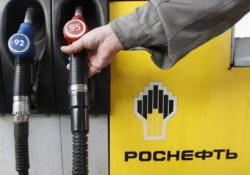|
 Sluggish
economy hits Russian fuel demand Sluggish
economy hits Russian fuel demand
 Send a link to a friend
Send a link to a friend
[February 09, 2015] By
Alexey Yarkovoy and Vladimir Soldatkin
MOSCOW (Reuters) - An economic downturn
exacerbated by a falling rouble and Western sanctions over Ukraine has
hit fuel demand in Russia, forcing energy companies to cut retail prices
and adding to the pressure many of them are feeling from lower oil
prices.
|
|
 The rouble has plunged around 50 percent against the dollar and oil,
Russia's chief export, has declined about the same, prompting
President Vladimir Putin to predict Russia's economy will suffer two
"most unfavorable" years. The rouble has plunged around 50 percent against the dollar and oil,
Russia's chief export, has declined about the same, prompting
President Vladimir Putin to predict Russia's economy will suffer two
"most unfavorable" years.
With car sales expected to tumble 25-35 percent this year as
recession takes hold, falling demand for fuel is set to persist.
Gazprom Neft, the biggest player in the small-scale wholesale market
for the Moscow region, cut fuel prices by up to 4 percent to around
34,100 rubles ($521) per tonne of gasoline and 31,700 rubles per
tonne of diesel last week.
Fuel sales at commodity exchanges have also fallen.

The St. Petersburg International Mercantile Exchange and The
Exchange St-Petersburg, the only exchanges in Russia which trade oil
products, sold 357,000 tonnes of oil products worth 9.2 billion
rubles ($140.5 million) on Feb. 2-6, down 5 percent in monetary
terms from the previous week, data showed.
In Siberia, demand has fallen sharply.
"Many factories have been cutting costs, they introduced a four-day
working week ... Even traffic jams have disappeared," an employee at
an oil storage facility in east Siberian city of Irkutsk said.
Market insiders said demand had been in decline following a decision
by the central bank to hike interest rates to defend falling rouble.
The bank raised its key interest rate to 17 percent from 10.5
percent in mid-December. Now it stands at 15 percent.
[to top of second column] |

At the same time, wholesale domestic prices have started to rise,
catching up with an increase in profitability from exports after
cuts in export duties from Jan. 1.
Traders said that exports of diesel have offered a premium of up to
10,000 rubles per tonne compared with domestic sales after exports
became more profitable when the government slashed the duty on them
and raised the mineral extraction tax.
The tax regime change, taken to try to balance an overstretched
budget, has already led to a surge in oil products exports from
Russia to Europe.
(Additional reporting by Maxim Nazarov; Writing by Vladimir
Soldatkin; Editing by Elizabeth Piper and Mark Potter)
[© 2015 Thomson Reuters. All rights
reserved.] Copyright 2015 Reuters. All rights reserved. This material may not be published,
broadcast, rewritten or redistributed.
 |